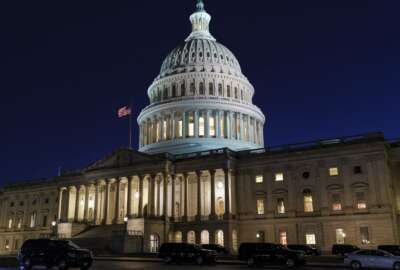
New House bill attempts to make presidential records more easily searchable
House Oversight and Reform Committee Chair Carolyn Maloney (D-N.Y.) introduced new legislation designed to make presidential records more easily searchable and...
To kick off Sunshine Week, House Oversight and Reform Committee Chair Carolyn Maloney (D-N.Y.) is introducing new legislation designed to update a decades-old presidential records law.
The bill, called the Presidential Records Preservation Act, would require the president, vice president and White House senior officials to “make and preserve” records that track the president’s official activities.
The bill would also require White House officials to establish specific records management controls to capture and preserve electronic records, and to make them easily searchable and accessible.
Several laws on managing federal and presidential records already exist. But Maloney said her bill would bring the Presidential Records Act — a 1978 act that governs the legal ownership structure of official records from previous and current administrations — in line with another law — the Federal Records Act.
The 1950 Federal Records Act created general policies for creating, maintaining and disposing certain agency records. It also established the legal framework for preserving those records as a way of documenting official agency activities.
Congress updated the law back in 2014 to include electronic messages and documents as another form of federal records.
“These reforms to the Presidential Records Act will strengthen the current law and improve transparency by requiring the president and the president’s senior advisors to document decisions,” she said in a statement.
Maloney introduced her new bill on the first day of Sunshine Week, an annual event that’s designed to highlight transparency and open government initiatives.
“I’m excited to kick off Sunshine Week,” Maloney said Monday in a video. “This week is dedicated to celebrating transparency and open government from the federal level to the local level. Open government and freedom of information are fundamental to a functioning democracy. The public deserves to know about the actions of their government in order to hold the government accountable.”
The House oversight committee will also release a new report from the Government Accountability Office later this week on agencies’ compliance with the Freedom of Information Act (FOIA), Maloney said.
Later this week, the Senate Homeland Security and Governmental Affairs Committee will consider several bills, including a few pieces of legislation aimed at improving government transparency.
The committee will mark up the Providing Accountability Through Transparency Act, which requires agencies to post short descriptions in plain language of proposed rules for public comment.
Senators will also consider the Congressional Budget Justification Transparency Act, which calls on agencies to make their requests for appropriations public. The House passed the bill in early January.
And in a video message to commemorate Sunshine Week, new Attorney General Merrick Garland thanked FOIA professionals within the Justice Department and throughout government.
“The principles of open government and democratic accountability are at the heart of who we are as public servants and as Americans,” he said. “Throughout my career, both as a judge and at DOJ, I’ve seen firsthand the importance of the statute that brings us together today, the Freedom of Information Act, and the DOJ’s special responsibility to ensure it’s faithful and effective administration.”
In 2020, FOIA professionals across government processed 770,000 record requests, which Garland said was impressive during a year when the pandemic interrupted operations.
“Today I am proud to say thank you to the dedicated FOIA professionals whose daily work and service to our country help make these principles real,” he added. “Thank you for your service. Thank you for keeping the faith.”
Copyright © 2025 Federal News Network. All rights reserved. This website is not intended for users located within the European Economic Area.
Nicole Ogrysko is a reporter for Federal News Network focusing on the federal workforce and federal pay and benefits.
Follow @nogryskoWFED
Related Stories





